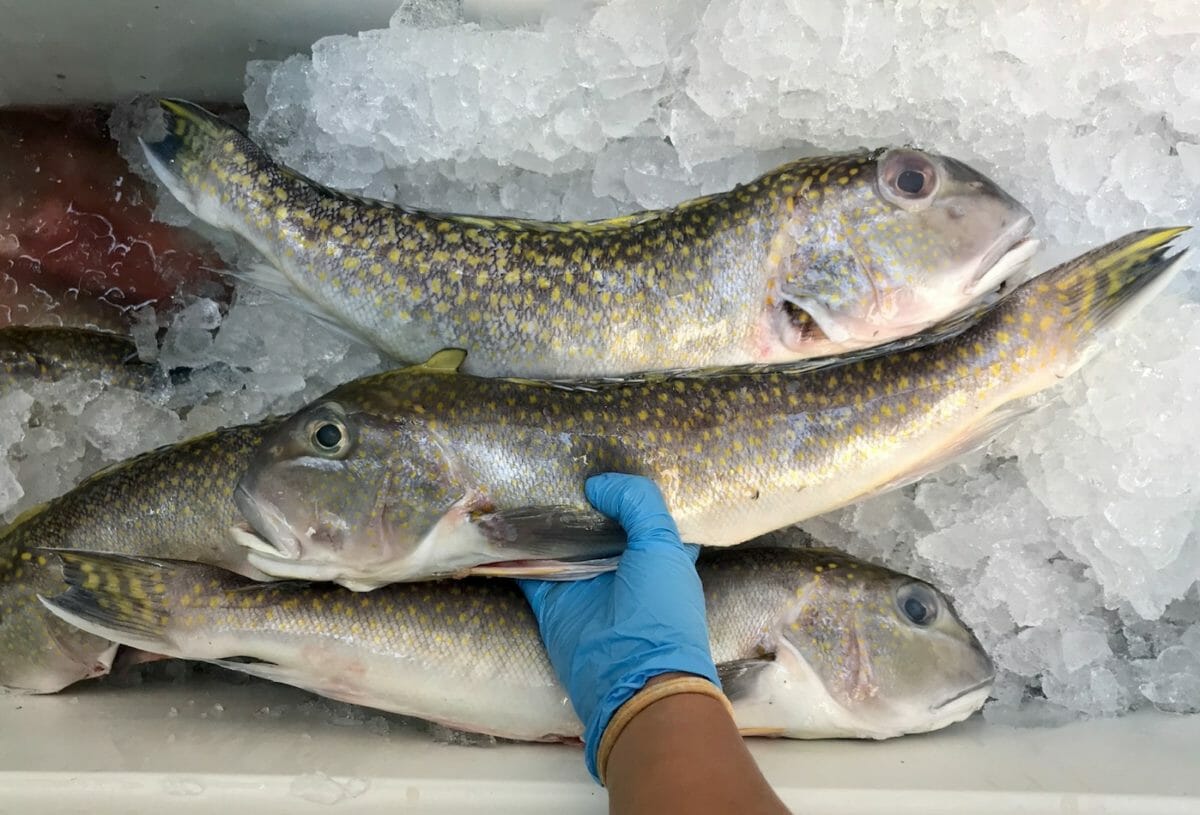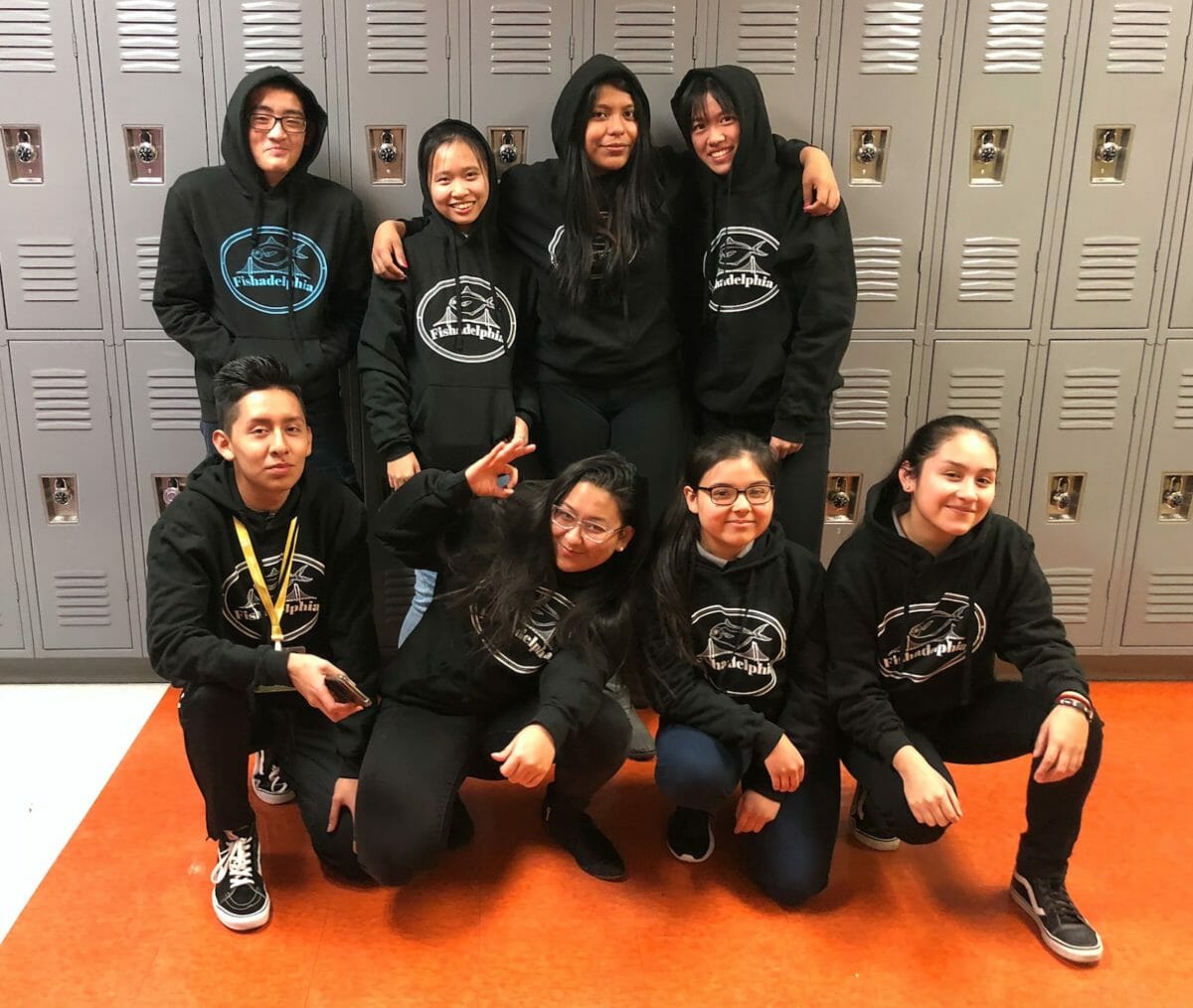Welcome to Fishadelphia
This organization is Philadelphia's first Community Supported Fishery.
Welcome to Fishadelphia
This organization is Philadelphia's first Community Supported Fishery.

A volunteer handles golden tilefish.courtesy of Fishadelphia.
It might come as a surprise to many that most of the seafood eaten by Americans was not caught by American fishermen (or fisherwomen).
We import most of the shrimp, freshwater fish, tuna and salmon, (to name a few) consumed by Americans from China, Thailand, Canada and other countries. The National Oceanic Atmospheric Administration estimates that 90 percent of the seafood consumed in the US is from abroad.
In Philadelphia, a college professor and a small cohort of students are looking to change this by attempting to rejig local supply chains. Their organization, Fishadelphia, the city’s first Community Supported Fishery program, hauls and packs seafood for members, in the hope of connecting them to American fish producers.
Talia Young, a visiting assistant professor of environmental studies at Haverford College, founded Fishadelphia in 2018 as a bi-weekly after-school program at the high school she used to teach science at. Young, a Chinese American, says she started the program after noticing a disconnect between US producers and multicultural communities while being embedded in local seafood movements through her academic research.
“People in the industry talk to me about seafood and often say things like, ‘Americans don’t really know how to eat seafood,’” she says. “They’re just not talking to the right Americans… I know a lot of people who eat a lot of different kinds of fish and have very deep and rich historical and contemporary relationships with seafood and they’re mostly Asian and Black.’”
Through its students, based in the culturally diverse neighborhoods of North and South Philadelphia, Fishadelphia taps into communities where seafood fisheries on the coast of New Jersey wouldn’t typically have access. The organization is funded through a number of federal and state grants. Over the past two years the organization has signed up 250 members to its Community Supported Fishery program and has bought more than 30,000 pounds of seafood from seven local producers.
Young says there will be anywhere from 12 to 20 students working or volunteering for the organization at any given time. Students pack fish, liaise with customers, and manage finances, among a number of other tasks. The organization hires students after they volunteer for one semester, if they choose to stay.
Wen Xin Weng, a recent high school graduate, has been with Fishadelphia since Young launched the organization. She now works part-time for the organization managing customer orders and bookkeeping. Weng says she was able to help source Fishadelphia orders into the Chinese community through a WeChat group she started two years ago. The group has grown to 50 Fishadelphia CSF members.
“It’s important that people know where their fish and seafood comes from,” Weng says, adding that she will often translate student-made Fishadelphia posters about the local seafood businesses and how the product is sourced. “We want people to have local fish and think it is a reliable source… We also want to introduce those farmers and all the people in the chain to our customers… It connects people.”

The amount and types of seafood offered through Fishadelphia shares vary based on what’s in season and what membership customers subscribe to. A share could contain anything from oysters and eels, clams and monkfish to squid and flounder. To ensure their product is as accessible as possible, parents with children and residents eligible for food stamps can subscribe at a discounted rate. Regardless of what the customer buys the share at, Young says she always pays the fish farmer the amount they ask for.
Lisa Calvo, who owns and manages Sweet Amalia Oyster Farm on Delaware Bay, provides a percentage of her oysters to Fishadelphia. While Calvo relies primarily on restaurants and pubs to purchase her oysters, she says it’s been helpful to have an additional customer base through Fishadelphia, particularly during the pandemic.
“Any endeavor is made richer by having a diverse team and a team that brings different perspectives,” she says. “Fishadelphia has created a really special platform in terms of reaching in minority audiences that I may not otherwise I’ve been in contact with.”
Young says in the future she would like to collaborate with farmers, like Calvo, to offer a Fishadelphia internship so that students have the opportunity to work alongside farmers and fishermen to acquire a more hands-on education in local seafood.
And at a time when the country feels increasingly polarized in every way, Young hopes that a love of seafood is something that can foster a connection between local seafood producers on the coast and culturally diverse communities in urban Philadelphia.
Follow us

This work is licensed under a Creative Commons Attribution-NoDerivatives 4.0 International License.
Want to republish a Modern Farmer story?
We are happy for Modern Farmer stories to be shared, and encourage you to republish our articles for your audience. When doing so, we ask that you follow these guidelines:
Please credit us and our writers
For the author byline, please use “Author Name, Modern Farmer.” At the top of our stories, if on the web, please include this text and link: “This story was originally published by Modern Farmer.”
Please make sure to include a link back to either our home page or the article URL.
At the bottom of the story, please include the following text:
“Modern Farmer is a nonprofit initiative dedicated to raising awareness and catalyzing action at the intersection of food, agriculture, and society. Read more at <link>Modern Farmer</link>.”
Use our widget
We’d like to be able to track our stories, so we ask that if you republish our content, you do so using our widget (located on the left hand side of the article). The HTML code has a built-in tracker that tells us the data and domain where the story was published, as well as view counts.
Check the image requirements
It’s your responsibility to confirm you're licensed to republish images in our articles. Some images, such as those from commercial providers, don't allow their images to be republished without permission or payment. Copyright terms are generally listed in the image caption and attribution. You are welcome to omit our images or substitute with your own. Charts and interactive graphics follow the same rules.
Don’t change too much. Or, ask us first.
Articles must be republished in their entirety. It’s okay to change references to time (“today” to “yesterday”) or location (“Iowa City, IA” to “here”). But please keep everything else the same.
If you feel strongly that a more material edit needs to be made, get in touch with us at [email protected]. We’re happy to discuss it with the original author, but we must have prior approval for changes before publication.
Special cases
Extracts. You may run the first few lines or paragraphs of the article and then say: “Read the full article at Modern Farmer” with a link back to the original article.
Quotes. You may quote authors provided you include a link back to the article URL.
Translations. These require writer approval. To inquire about translation of a Modern Farmer article, contact us at [email protected]
Signed consent / copyright release forms. These are not required, provided you are following these guidelines.
Print. Articles can be republished in print under these same rules, with the exception that you do not need to include the links.
Tag us
When sharing the story on social media, please tag us using the following: - Twitter (@ModFarm) - Facebook (@ModernFarmerMedia) - Instagram (@modfarm)
Use our content respectfully
Modern Farmer is a nonprofit and as such we share our content for free and in good faith in order to reach new audiences. Respectfully,
No selling ads against our stories. It’s okay to put our stories on pages with ads.
Don’t republish our material wholesale, or automatically; you need to select stories to be republished individually.
You have no rights to sell, license, syndicate, or otherwise represent yourself as the authorized owner of our material to any third parties. This means that you cannot actively publish or submit our work for syndication to third party platforms or apps like Apple News or Google News. We understand that publishers cannot fully control when certain third parties automatically summarize or crawl content from publishers’ own sites.
Keep in touch
We want to hear from you if you love Modern Farmer content, have a collaboration idea, or anything else to share. As a nonprofit outlet, we work in service of our community and are always open to comments, feedback, and ideas. Contact us at [email protected].by Lindsay Campbell, Modern Farmer
December 5, 2020
Modern Farmer Weekly
Solutions Hub
Innovations, ideas and inspiration. Actionable solutions for a resilient food system.
ExploreExplore other topics
Share With Us
We want to hear from Modern Farmer readers who have thoughtful commentary, actionable solutions, or helpful ideas to share.
SubmitNecessary cookies are absolutely essential for the website to function properly. This category only includes cookies that ensures basic functionalities and security features of the website. These cookies do not store any personal information.
Any cookies that may not be particularly necessary for the website to function and are used specifically to collect user personal data via analytics, ads, other embedded contents are termed as non-necessary cookies.
I want to know as specifically as possible where the product was harvested. If possible are samples lab tested for heavy metals and pesticides or otherwise vetted for safety? Our local waters are questionable. I am a cautious person and a NJ CSA member.